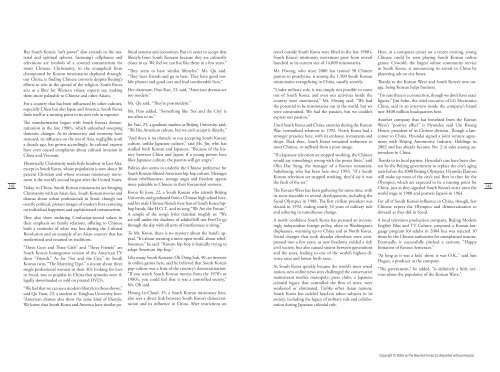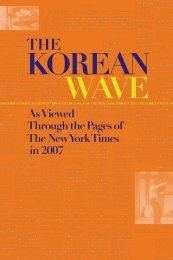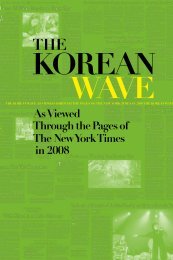The Korean Wave 2006 - Korean Cultural Service
The Korean Wave 2006 - Korean Cultural Service
The Korean Wave 2006 - Korean Cultural Service
Create successful ePaper yourself
Turn your PDF publications into a flip-book with our unique Google optimized e-Paper software.
142<br />
But South Korea’s “soft power” also extends to the material<br />
and spiritual spheres. Samsung’s cellphones and<br />
televisions are symbols of a coveted consumerism for<br />
many Chinese. Christianity, in the evangelical form<br />
championed by <strong>Korean</strong> missionaries deployed throughout<br />
China, is finding Chinese converts despite Beijing’s<br />
efforts to rein in the spread of the religion. South Korea<br />
acts as a filter for Western values, experts say, making<br />
them more palatable to Chinese and other Asians.<br />
For a country that has been influenced by other cultures,<br />
especially China but also Japan and America, South Korea<br />
finds itself at a turning point in its new role as exporter.<br />
<strong>The</strong> transformation began with South Korea’s democratization<br />
in the late 1980’s, which unleashed sweeping<br />
domestic changes. As its democracy and economy have<br />
matured, its influence on the rest of Asia, negligible until<br />
a decade ago, has grown accordingly. Its cultural exports<br />
have even caused complaints about cultural invasion in<br />
China and Vietnam.<br />
Historically, Christianity made little headway in East Asia,<br />
except in South Korea, whose population is now about 30<br />
percent Christian and whose overseas missionary movement<br />
is the world’s second largest after the United States.<br />
Today, in China, South <strong>Korean</strong> missionaries are bringing<br />
Christianity with an Asian face. South <strong>Korean</strong> movies and<br />
dramas about urban professionals in Seoul, though not<br />
overtly political, present images of modern lives centering<br />
on individual happiness and sophisticated consumerism.<br />
<strong>The</strong>y also show enduring Confucian-rooted values in<br />
their emphasis on family relations, offering to Chinese<br />
both a reminder of what was lost during the <strong>Cultural</strong><br />
Revolution and an example of an Asian country that has<br />
modernized and retained its traditions.<br />
“Three Guys and Three Girls” and “Three Friends” are<br />
South Korea’s homegrown version of the American TV<br />
show “Friends.” As for “Sex and the City,” its South<br />
<strong>Korean</strong> twin, “<strong>The</strong> Marrying Type,” a sitcom about three<br />
single professional women in their 30’s looking for love<br />
in Seoul, was so popular in China that episodes were illegally<br />
downloaded or sold on pirated DVD’s.<br />
“We feel that we can see a modern lifestyle in those shows,”<br />
said Qu Yuan, 23, a student at Tsinghua University here.<br />
“American dramas also show the same kind of lifestyle.<br />
We know that South Korea and America have similar political<br />
systems and economies. But it’s easier to accept that<br />
lifestyle from South <strong>Korean</strong>s because they are culturally<br />
closer to us. We feel we can live like them in a few years.”<br />
“<strong>The</strong>y seem to have similar lifestyles,” Ms. Qu said.<br />
“<strong>The</strong>y have friends and go to bars. <strong>The</strong>y have good mobile<br />
phones and good cars and lead comfortable lives.”<br />
Her classmate, Huo Kan, 23, said, “American dramas are<br />
too modern.”<br />
Ms. Qu said, “<strong>The</strong>y’re postmodern.”<br />
Ms. Huo added, “Something like ‘Sex and the City’ is<br />
too alien to us.”<br />
Jin Yaxi, 25, a graduate student at Beijing University, said,<br />
“We like American culture, but we can’t accept it directly.”<br />
“And there is no obstacle to our accepting South <strong>Korean</strong><br />
culture, unlike Japanese culture,” said Ms. Jin, who has<br />
studied both <strong>Korean</strong> and Japanese. “Because of the history<br />
between China and Japan, if a young person here<br />
likes Japanese culture, the parents will get angry.”<br />
Politics also seems to underlie the Chinese preference for<br />
South <strong>Korean</strong>-filtered American hip-hop culture. Messages<br />
about rebelliousness, teenage angst and freedom appear<br />
more palatable to Chinese in their <strong>Korean</strong>ized versions.<br />
Kwon Ki Joon, 22, a South <strong>Korean</strong> who attends Beijing<br />
University and graduated from a Chinese high school here,<br />
said his male Chinese friends were fans of South Korea hiphop<br />
bands, like H.O.T., and its song “We Are the Future.”<br />
A sample of the song’s lyrics translate roughly as: “We<br />
are still under the shadows of adults/Still not Free/To go<br />
through the day with all sorts of interferences is tiring.”<br />
To Mr. Kwon, there is no mystery about the band’s appeal.<br />
“It’s about wanting a more open world, about rebelliousness,”<br />
he said. “<strong>Korean</strong> hip-hop is basically trying to<br />
adapt American hip-hop.”<br />
Like many South <strong>Korean</strong>s, Oh Dong Suk, 40, an investor<br />
in online games here, said he believed that South Korea’s<br />
pop culture was a fruit of the country’s democratization.<br />
“If you watch South <strong>Korean</strong> movies from the 1970’s or<br />
1980’s, you could feel that it was a controlled society,”<br />
Mr. Oh said.<br />
Hwang In Choul, 35, a South <strong>Korean</strong> missionary here,<br />
also sees a direct link between South Korea’s democratization<br />
and its influence in China. After restrictions on<br />
travel outside South Korea were lifted in the late 1980’s,<br />
South Korea’s missionary movement grew from several<br />
hundred to its current size of 14,000 missionaries.<br />
Mr. Hwang, who since 2000 has trained 50 Chinese<br />
pastors to proselytize, is among the 1,500 South <strong>Korean</strong><br />
missionaries evangelizing in China, usually secretly.<br />
“Under military rule, it was simply not possible to come<br />
out of South Korea, and even our activities inside the<br />
country were monitored,” Mr. Hwang said. “We had<br />
the potential to be missionaries out in the world, but we<br />
were constrained. We had the passion, but we couldn’t<br />
express our passion.”<br />
Until South Korea and China, enemies during the <strong>Korean</strong><br />
War, normalized relations in 1992, North Korea had a<br />
stronger presence here, with its embassy, restaurants and<br />
shops. Back then, South Korea remained unknown to<br />
most Chinese, or suffered from a poor image.<br />
“If a Japanese television set stopped working, the Chinese<br />
would say something’s wrong with the power lines,” said<br />
Ohn Dae Sung, the manager of a <strong>Korean</strong> restaurant,<br />
Suboksung, who has been here since 1993. “If a South<br />
<strong>Korean</strong> television set stopped working, they’d say it was<br />
the fault of the set.”<br />
<strong>The</strong> <strong>Korean</strong> <strong>Wave</strong> has been gathering for some time, with<br />
its roots traceable to several developments, including the<br />
Seoul Olympics in 1988. <strong>The</strong> first civilian president was<br />
elected in 1992, ending nearly 32 years of military rule<br />
and ushering in tumultuous change.<br />
A newly confident South Korea has pursued an increasingly<br />
independent foreign policy, often to Washington’s<br />
displeasure, warming up to China and to North Korea.<br />
Social changes that took decades elsewhere were compressed<br />
into a few years, as new freedoms yielded a rich<br />
civil society, but also caused strains between generations<br />
and the sexes, leading to one of the world’s highest divorce<br />
rates and lowest birth rates.<br />
As South Korea quickly became the world’s most wired<br />
nation, new online news sites challenged the conservative<br />
mainstream media’s monopoly; press clubs, a Japanese<br />
colonial legacy that controlled the flow of news, were<br />
weakened or eliminated. Unlike other Asian nations,<br />
South Korea has tackled head-on taboo subjects in its<br />
society, including the legacy of military rule and collaboration<br />
during Japanese colonial rule.<br />
Here, at a computer center on a recent evening, young<br />
Chinese could be seen playing South <strong>Korean</strong> online<br />
games. Cyworld, the largest online community service<br />
in South Korea, is announcing its arrival in China by<br />
plastering ads on city buses.<br />
Thanks to the <strong>Korean</strong> <strong>Wave</strong> and South Korea’s new image,<br />
being <strong>Korean</strong> helps business.<br />
“I’m sure there is a connection, though we don’t have exact<br />
figures,” Jim Sohn, the chief executive of LG Electronics<br />
China, said in an interview inside the company’s brand<br />
new $400 million headquarters here.<br />
Another company that has benefited from the <strong>Korean</strong><br />
<strong>Wave</strong>’s “positive effect” is Hyundai, said Um Kwang<br />
Heum, president of its Chinese division. Though a latecomer<br />
to China, Hyundai signed a joint venture agreement<br />
with Beijing Automotive Industry Holdings in<br />
2002 and has already become No. 2 in sales among automakers<br />
in China.<br />
Thanks to its local partner, Hyundai’s cars have been chosen<br />
by the Beijing government to replace the city’s aging<br />
taxis before the 2008 Beijing Olympics. Hyundai Elantras<br />
will make up most of the city’s taxi fleet in time for the<br />
Olympics, which are expected to be a turning point for<br />
China, just as they signaled South Korea’s entry onto the<br />
world stage in 1988 and postwar Japan’s in 1964.<br />
For all of South Korea’s influence in China, though, few<br />
Chinese expect the Olympics and democratization to<br />
dovetail as they did in Seoul.<br />
A local television production company, Beijing Modern<br />
English Film and TV Culture, proposed a <strong>Korean</strong>-language<br />
program for adults in 2004 but was rejected 10<br />
times by the Chinese authorities for unexplained reasons.<br />
Eventually, it successfully pitched a cartoon, “Happy<br />
Imitation of <strong>Korean</strong> Sentences.”<br />
“As long as it was a kids’ show, it was O.K.,” said Sun<br />
Hogan, a producer at the company.<br />
“<strong>The</strong> government,” he added, “is definitely a little nervous<br />
about the popularity of the <strong>Korean</strong> <strong>Wave</strong>.”<br />
143<br />
Copyright © <strong>2006</strong> by <strong>The</strong> New York Times Co. Reprinted with permission.





